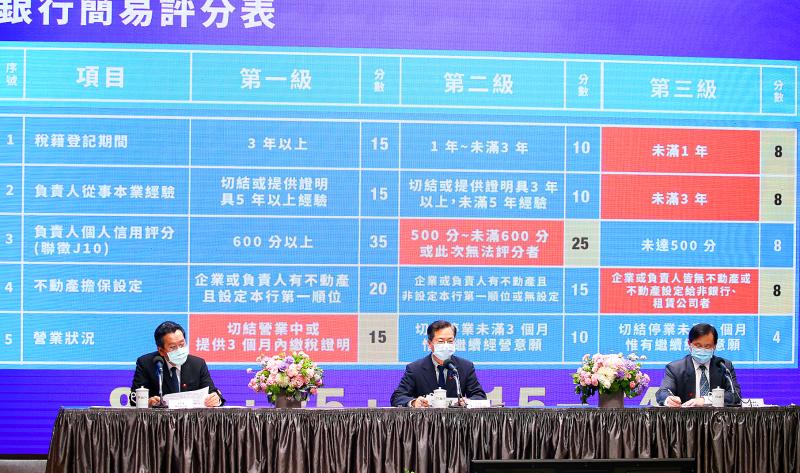Local banks had approved 8,254 loan applications totaling NT$124 billion (US$4.16 billion) for businesses affected by the COVID-19 pandemic as of Wednesday last week, a surge of 63 percent and 51.9 percent respectively from a week earlier, according to figures released by the Financial Supervisory Commission (FSC).
Seventy-two percent of the loans, or NT$89.9 billion, were provided to 7,778 companies under a Ministry of Economic Affairs assistance program for the nation’s manufacturers and small and medium-sized enterprises, commission data showed.
The ministry last month announced that it would subsidize interest payments for companies whose revenue dropped by at least 15 percent from last year’s average, on condition that the companies do not reduce their employees’ working hours or salaries.

Photo: CNA
Another 27.5 percent of the loans, or NT$34.1 billion, were offered to 473 tourism agencies, airlines, hotels and transportation firms. The Ministry of Transportation and Communications is to help subsidize those firms with interest payments and handling fees.
A total of 1,600 farmers, fishers and other agricultural businesses were granted loans totaling NT$8 million, while two cultural businesses were granted loans of NT$1.95 million, the data showed.
As for affected companies or individuals who do not qualify for the government’s relief program, banks approved 27,436 applications for loan extensions or new loans totaling NT$234.2 billion, the commission said.
Overall, banks had offered NT$358.33 billion to 35,690 affected firms as of Wednesday last week, the data showed.
Seventy-one percent of the loans, or 19,264 applications for NT$254.4 billion, were provided by state-run banks, for an average of NT$13 million per application, while private banks lent NT$103.9 billion to 16,426 firms, for an average of NT$6.32 million per application, data showed.
State-run Bank of Taiwan (臺灣銀行) ranked first, granting loans totaling NT$69.3 billion to 2,568 companies or individuals, the commission said.
Cathay United Bank (國泰世華銀行) ranked first among private banks with loans of NT$21.3 billion, followed by Taichung Commercial Bank (台中商銀) with NT$14.9 billion and E.Sun Commercial Bank (玉山銀行) with NT$11.3 billion, commission data showed.
Separately on Friday, several labor advocates said that employees had been left behind by the government’s economic stimulus plans.
Although Taiwan has so far been spared the worst of the pandemic, many workers in affected industries have been furloughed, Confederation of Taipei Trade Unions president Cheng Ya-hui (鄭雅慧) said.
Cheng said that labor groups “have had to push the government every step of the way” to secure stimulus funding, while the government’s industry-by-industry approach has led to waste.
Taiwan Confederation of Trade Unions president Chuang Chueh-an (莊爵安) on Friday said that stimulus benefits — mainly low-interest loans and cash payments for low-income earners — should be increased and made more accessible.
Additional reporting by CNA

In Italy’s storied gold-making hubs, jewelers are reworking their designs to trim gold content as they race to blunt the effect of record prices and appeal to shoppers watching their budgets. Gold prices hit a record high on Thursday, surging near US$5,600 an ounce, more than double a year ago as geopolitical concerns and jitters over trade pushed investors toward the safe-haven asset. The rally is putting undue pressure on small artisans as they face mounting demands from customers, including international brands, to produce cheaper items, from signature pieces to wedding rings, according to interviews with four independent jewelers in Italy’s main

Japanese Prime Minister Sanae Takaichi has talked up the benefits of a weaker yen in a campaign speech, adopting a tone at odds with her finance ministry, which has refused to rule out any options to counter excessive foreign exchange volatility. Takaichi later softened her stance, saying she did not have a preference for the yen’s direction. “People say the weak yen is bad right now, but for export industries, it’s a major opportunity,” Takaichi said on Saturday at a rally for Liberal Democratic Party candidate Daishiro Yamagiwa in Kanagawa Prefecture ahead of a snap election on Sunday. “Whether it’s selling food or

CONCERNS: Tech companies investing in AI businesses that purchase their products have raised questions among investors that they are artificially propping up demand Nvidia Corp chief executive officer Jensen Huang (黃仁勳) on Saturday said that the company would be participating in OpenAI’s latest funding round, describing it as potentially “the largest investment we’ve ever made.” “We will invest a great deal of money,” Huang told reporters while visiting Taipei. “I believe in OpenAI. The work that they do is incredible. They’re one of the most consequential companies of our time.” Huang did not say exactly how much Nvidia might contribute, but described the investment as “huge.” “Let Sam announce how much he’s going to raise — it’s for him to decide,” Huang said, referring to OpenAI

Nvidia Corp’s negotiations to invest as much as US$100 billion in OpenAI have broken down, the Wall Street Journal (WSJ) reported, exposing a potential rift between two of the most powerful companies in the artificial intelligence (AI) industry. The discussions stalled after some inside Nvidia expressed concerns about the transaction, the WSJ reported, citing unidentified people familiar with the deliberations. OpenAI makes the popular chatbot ChatGPT, while Nvidia dominates the market for AI processors that help develop such software. The companies announced the agreement in September last year, saying at the time that they had signed a letter of intent for a strategic